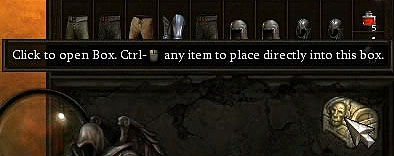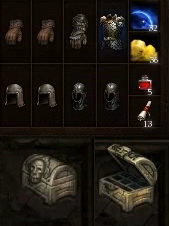Salvage
Salvaging is a mechanic that allows players to break down items, such as weapons and armor, into raw materials that can be used for Crafting, as well as Training the NPC Artisans.
Salvaging can be done in the field, and is designed to save space and trips back to town, as well as providing raw materials for crafting new items. The process of salvaging is accomplished with the Nephalem Cube.
The Salvage Cube
The first secret of the salvage cube is that it's not called the "salvage cube." There's a lore and a story behind it that's not been revealed yet[1], however, we are privy to its name. According to Bashiok, it is named the "Nephalem Cube"[2]:
- Bashiok, is it true? Is the salvage cube named the Nephalem cube? Would you mind clearing up the confusion you unfortunately created with the possible misinformation?
Bashiok had said that the name of the cube was a slight spoiler, so it would make sense to expect some sort of presence of the Nephalem in Diablo III. Jay Wilson called it just a "special artefact" in the Artisan video. Into this void had stepped fans with early options including the Horadric Dumpster, Horadric Recycling Bin, and Horadric Trash Can.
That said, no matter what fancy name and lore it's given, it seems likely that fans will all just call it the cube, or chest, or box. What we do know about the Chest is that it's given to the player by Haedrig Eamon, the Blacksmith, as a quest reward early in the game.
Once used for the first time, the salvage cube vanishes from the character's inventory and appears on the lower right of the inventory window, where it remains permanently; part of the interface where it does not take up any inventory space.

The image to the left depicts the Nephalem Cube as of the demo in BlizzCon 2010. This iteration of the cube is much more reminiscent of the horadric cube from Diablo II. It may or may not be worth noting that this cube is the same graphic that Blizzard used for their April Fool's joke in 2010, the "Horadric Cube app".
Materials
Materials are produced by salvaging items. The materials generated are semi-random; identical items may return slightly varying amounts of material.
There are numerous types of materials, including some very rare ones that can only be obtained by salvaging very high level items. Since rare materials are needed to craft high level recipes, players will have to work to find uncommon items that they don't actually want to use, and may end up debating between using, salvaging, or trading a nice item.
Only a few materials are known so far.
User Interface/Mechanics
Once the Nephalem Cube is obtained from the Blacksmith, it shows in the lower right corner of the Inventory window. The chest appears closed, when not in use. Once clicked upon, it opens up and a 3x2 space box appears in the center of the screen. Items to be salvaged can be dragged (or control+clicked with one touch) into the chest.
Once activated, the salvage chest will instantly reduce all the items in it into raw materials, which stack up in the character's inventory.
It's not known if salvaged items can be recovered, in case of a misclick. Accidentally sold items can be bought back from from the Artisans, so it's possible there will be some recovery method for inadvertent salvaging as well. Probably not though, since that could be exploited in at least two ways:
- Since the materials returned are semi-random, players could repeatedly salvage the same item, trying for a better materials roll.
- Even if the materials were permanently set on that particular item, simply knowing what it was going to salvage for would let the player decide to salvage or try to trade it.
RPG Parallels
Salvaging is similar to World of Warcraft's' Disenchanting, a Sub-skill of Enchanting.
It's also virtually identical to the Hellgate: London system that allowed players to break down items into their components, which could then be used in recipes to create new items.
| Items of Diablo III [e] Item Basics Normal Items Crafting Legendary Armor I Legendary Armor II Legendary Weapons 1h Legendary Weapons 2h Item Sets |
|---|


